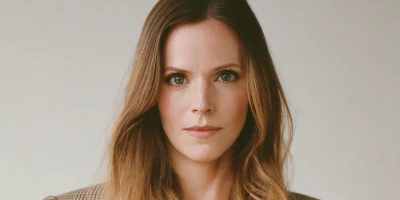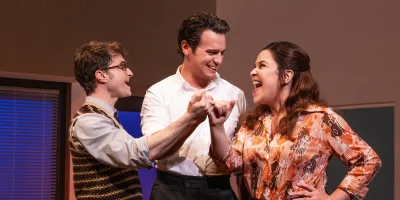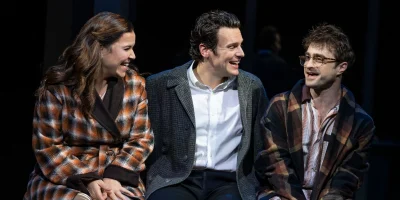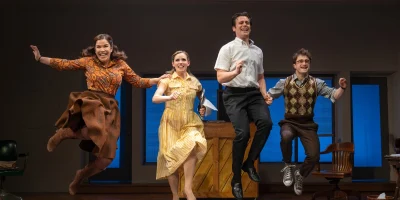
All the songs in 'Merrily We Roll Along' on Broadway
A flop in 1981, Stephen Sondheim’s musical about old friends is now a Tony Award-nominated hit starring Jonathan Groff, Daniel Radcliffe, and Lindsay Mendez.
“It’s a hit!”
So goes the refrain sung by best friends Franklin Shepard, Charley Kringas, and Mary Flynn early in the second act of Merrily We Roll Along, Stephen Sondheim and George Furth’s onetime flop which is now Broadway’s hottest ticket. In “It’s a Hit,” the trio celebrate Frank and Charley’s new musical on opening night.
In contrast, when Merrily premiered on Broadway in 1981, it closed as quickly as it opened. But now, a new revival directed by Maria Friedman and led by Jonathan Groff, Daniel Radcliffe, and Lindsay Mendez has earned critical acclaim and seven Tony Award nominations, including Best Musical Revival.
So what changed? Or, to quote another lyric from the show: “How did you get to be here?”
The show’s songs give one hint: Merrily tells a bitter tale in an unusual way. The musical traces the collapse of Frank, Charley, and Mary’s friendship backward, beginning with anger and disappointment and ending with the youthful optimism of their first meeting — which feels tragic since we know where it leads.
The musical numbers situate the audience in time and show how the friends' feelings shift over the course of 20 years. Learn more about all the songs in Merrily We Roll Along, at Broadway’s Hudson Theatre through July 7.
“Merrily We Roll Along”
The chorus sings mournfully about holding onto your dreams: “Tend your dream; dreams take time.” Playwright Charley Kringas and critic Mary Flynn wonder how their lifelong friend Franklin Shepard, once a great composer, gave up on his dreams. “How did you get to be here?” they ask.
Merrily originally began with Frank delivering a cynical speech at a high school graduation, urging the students to compromise their dreams. Sondheim and Furth removed this part when revising the show.
“That Frank”
Los Angeles, 1976: Frank, a rich and successful film producer, celebrates his latest trashy release and insists he’s never been happier: “It’s our time coming through, all our dreams coming true.” A drunken Mary, who has long had feelings for Frank, insults his film and leaves. His wife, Gussie Carnegie, confronts Frank over an affair, and he ends their marriage. Frank has everything, but there is no one left by his side.
“First Transition”
The ensemble guides us back in time, asking: “How did you ever get to be here?” The year is now 1973.

“Old Friends — Like It Was”
Charley and Frank prepare for a live television interview to promote a movie adaptation of their musical. Despite their lifelong writing partnership, Charley complains to Mary that he is seeing Frank less. She encourages him not to let the trio’s friendship die, repeating their shared mantra: “Here’s to us! Who’s like us?” Charley finishes the sentence: “Damn few.”
But Mary also mourns the way things used to be, wondering if they’ve all lost their way. Charley realizes Mary is still in love with Frank.
“Franklin Shepard, Inc.”
Before the interview begins, Charley is blindsided with the news that Frank has signed a new three-picture deal. Realizing the two will never write another musical, Charlie unleashes a torrent of rage against Charley on air, calling him a money-obsessed sellout who abandoned his best friend and his musical talent: “He flies off to California; I discuss him with my shrink.” By the end of the interview, their partnership – and friendship – is over.
“Second Transition”
The ensemble takes us back another five years – it is now 1968.

“Old Friends”
Mary and Charley visit Frank in New York following his divorce from his first wife, Beth. Frank is excited to tell Charley that their show “Musical Husbands” has been optioned for a movie – but Charley rejects the idea, urging Frank to focus on songwriting.
To prevent an argument, Mary plays peacemaker, singing of the trio’s longtime bond. Charley and Frank join in, and the three celebrate their enduring friendship, singing together: “Here’s to us! Who’s like us? Damn few.” Frank promises to meet them downtown later that night.
“Growing Up”
Now alone, Frank struggles with his competing desire for stability vs. artistic fulfillment. He convinces himself, gradually, that his new dreams of fame and fortune are valid: “Adding dreams… when the others don’t last.”
The actress Gussie Carnegie, with whom Frank had an affair during his first marriage, arrives to tell Frank that she left her husband Joe, a producer on Frank’s shows. She convinces Frank to spend the night with her rather than his friends, asking: “What is it you really want?”
This song was not part of the show’s original Broadway staging – it was added by Sondheim for a 1985 version at La Jolla Playhouse and retained for all future productions.
“Third Transition”
The chorus ponders how we all travel through our lives, gathering dreams along the way, “rolling along.”

“Not a Day Goes By — Intro”
In 1966, Frank and Beth talk outside their divorce hearing. She threatens to make their separation a painful battle if Frank forces her. He asks if she still loves him, to which she asks: “Did you sleep with her, Frank?”
“Not a Day Goes By”
In one of the show's most famous songs, Beth painfully confesses that her love for Frank will never die, even though he broke her heart: “And you won’t go away, so there’s hell to pay.” Their marriage is over.
“Now You Know”
Charley, Mary and Joe all console Frank, convincing him everything happens for a reason. They send him off on a cruise to recover from the divorce, with the assuring refrain: “Best thing that ever could have happened.”
A 2016 documentary about the show’s Broadway premiere borrowed that lyric for its title, with a slight adjustment: it is called Best Worst Thing That Ever Could Have Happened. Lonny Price, who played Charley in the original production, directed the film.
“Gussie's Opening Number”
In 1964 New York, Gussie Carnegie performs the opening number of Frank and Charley’s hit show Musical Husbands on its opening night on Broadway.

“It's a Hit!”
Backstage at the opening night, Charley, Frank, Mary, and Joe (the show’s producer) soak in the wild applause from the crowd. Frank and Charley realize they have a hit on their hands, singing in unison: “It’s the theatre, and we’re really in it, not just on the edge!”
Seinfeld star Jason Alexander played Joe in the original Broadway production, making his Broadway debut.
“Fourth Transition”
“Dreams take time,” the ensemble assures us, taking us back in time another three years to 1962.
“The Blob — Part 1”
At a party at Joe’s apartment, Frank meets Joe’s wife, Gussie. She introduces “The Blob” – the shallow, status- and fame-obsessed New Yorkers who fill the party crowd.
“Growing Up — Reprise”
Gussie assures Frank, as flirtatiously as possible, that performing for “The Blob” will get him everything he wants. Her words are a reprise of Frank’s own self-assurance, years later, that his dreams of fame and fortune are valid. Gussie first stokes that hunger in Frank’s heart here.
“Good Thing Going”
Frank and Charley perform their new song “Good Thing Going” for the party guests at Gussie’s urging. Slow and somber, it is an unintended, unknowing farewell to the pair’s artistic partnership. Charley sings: “We had a good thing going… going… gone.”

“The Blob — Part 2”
Gussie forces the pair to perform the song again against Charley’s wishes. He and Frank sing together this time. But “The Blob” loses interest before they're done, talking over the song and moving on to the next exciting thing.
"Fifth Transition"
The ensemble takes us back another two years, to 1960.
"Bobby and Jackie and Jack"
Frank, Charley and Mary perform this fictional, satirical musical revue at the Downtown Club for a small crowd. The song is about the Kennedys, predicting a hopeful time of promise for America ahead – with just a hint of what is truly to come.
"Not a Day Goes By — Reprise"
Later that night, Frank and Beth get married at the club. Beth sings of her undying devotion to Frank — the same profession of lifelong love we first heard outside the pair’s divorce hearing.
"Sixth Transition"
“Once, it was all so clear. How did you get so far off the track?” As we approach the trio's optimistic early years, the ensemble’s tone grows darker. They take us back two more years, to 1958.

"Opening Doors"
Frank, Charley and Mary pursue their respective passions with optimism and zeal. As they struggle through professional stumbles, breakups, and doors slammed in their face, the trio sharing the highs and lows together as they push forward: “Openings doors, singing 'here we are!'”
They also put on a musical revue of their own. Beth and Frank meet for the first time when she auditions for it and gets the role.
"Seventh Transition"
The show's final transition is a brief reprise of the opening number. The final line, "rolling along," is sung by Frank’s young son, Franklin Shepard, Jr., a symbol of youth and hope.
"Our Time"
In 1957, Frank and Charley meet on the rooftop of their building in New York, both waiting to catch a glimpse of the Russian satellite Sputnik. Frank wants to turn one of Charley’s plays into a musical. Their neighbor, Mary, also arrives on the roof and meets the boys for the first time.
They spot Sputnik, a light in the sky floating above them. Together, the three sing of hope for a future full of possibilities.
Photo credit: Merrily We Roll Along on Broadway. (Photos by Matthew Murphy)
Frequently asked questions
What is Merrily We Roll Along on Broadway about?
Daniel Radcliffe, Jonathan Groff, and Lindsay Mendez star in the first Broadway revival of this Sondheim musical. The story of of three artists whose friendship falls apart starts at the end and ends at the beginning. Knowing their future, can something in the past change their fate? Relive your teenage years at Merrily We Roll Along and learn more about tickets today.
Where is Merrily We Roll Along on Broadway playing?
Merrily We Roll Along on Broadway is playing at Hudson Theatre. The theatre is located at 141 West 44th Street, New York, 10036.
How long is Merrily We Roll Along on Broadway?
The running time of Merrily We Roll Along on Broadway is 2hr 30min. Incl. 15min intermission.
What's the age requirement for Merrily We Roll Along on Broadway?
The recommended age for Merrily We Roll Along on Broadway is Ages 10+. Children under 4 are not permitted in the theater..
How do you book tickets for Merrily We Roll Along on Broadway?
Book tickets for Merrily We Roll Along on Broadway on New York Theatre Guide.
Who wrote Merrily We Roll Along?
The script for Merrily We Roll Along is by George Furth, adapted from George S. Kaufman and Moss Hart's 1934 play of the same name. The music and lyrics are by Stephen Sondheim, who previously collaborated with Furth on Company.
Which songs are in Merrily We Roll Along?
Merrily We Roll Along's score includes the famous Sondheim songs "Good Thing Going," "Not a Day Goes By," "Like It Was," and "Merrily We Roll Along." There are 26 musical numbers in the show.
Is Merrily We Roll Along appropriate for kids?
Merrily We Roll Along is recommended for children 10 and older due to some strong language and references to alcoholism and adultery. Please note that children 4 and younger are not permitted in Broadway theatres.
When has Daniel Radcliffe been on Broadway?
Daniel Radcliffe has been on Broadway multiple times before in shows like How to Succeed in Business Without Really Trying in 2011. Learn more about all of Daniel Radcliffe's Broadway and international stage credits.
How long is Merrily We Roll Along playing on Broadway?
Merrily We Roll Along is on Broadway through March 24, 2024 only at the Hudson Theatre.
Who is in the cast of Merrily We Roll Along?
Merrily We Roll Along on Broadway stars Daniel Radcliffe as Charley Kringas, Jonathan Groff as Frank Shepard, and Lindsay Mendez as Mary Flynn. Learn more about Merrily We Roll Along and its cast.
Who directed Merrily We Roll Along?
Maria Friedman directs Merrily We Roll Along. Her production, which she first staged in London in 2012 before bringing it on and off Broadway in 2023, received critical acclaim in both the U.K. and U.S.
Is Merrily We Roll Along good?
Merrily We Roll Along is among the best-reviewed shows on New York Theatre Guide. Our four-star review of the Off-Broadway production praises Groff, Radcliffe, and Mendez's performances and reads, "The story’s consideration of the fragility of friendships stands out."
Originally published on





